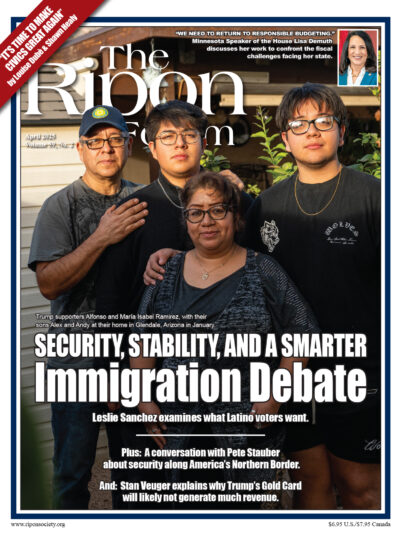
President Donald Trump’s recent executive orders dealing with birthright citizenship constitutes, I believe, the first step in reconsidering what it means to be “subject to the jurisdiction” of the United States. The Fourteenth Amendment requires that, in addition to being born within the geographical limits of the United States, all persons must also be “subject to the jurisdiction” of the United States. There are thus two requirements for citizenship. Not everyone born on American soil is a citizen by birth because not everyone is subject to the jurisdiction of the United States.
The leading case on the issue of birthright citizenship is United States v. Wong Kim Ark (1898). Justice Horace Gray, writing the majority decision, argued that the plain language of the Fourteenth Amendment established that American citizenship is based on the English Common Law. The immediate problem with Justice Gray’s conclusion is that the language “subject to the jurisdiction” is completely alien to the common law. In some ways, the question of birthright citizenship is complicated; but it is easy to show that the decision in Wong Kim Ark violates the principles of the American Founding and the intentions of the framers of the Fourteenth Amendment and should be overturned forthwith.
There are thus two requirements for citizenship. Not everyone born on American soil is a citizen by birth because not everyone is subject to the jurisdiction of the United States.
Contrary to much learned opinion that is freely bandied about, repealing birthright citizenship does not require a constitutional amendment. It can be done by using section five of the Fourteenth Amendment which gives Congress the power to enforce the provisions of the amendment. Congress can simply specify who is “subject to the jurisdiction.”
Why does the Wong Kim Ark decision violate the principles of the American Founding? Before the Declaration of Independence in 1776, Americans were subject to the English Common Law. Under the common law the American people owed “perpetual allegiance” to the King as a “debt of gratitude” in return for having been born within his protection. This was an “allegiance”—a “debt”—that could not be thrown off or cancelled without the King’s permission. William Blackstone, in his authoritative four volume Commentaries on the Laws of England, published between 1765 and 1769, and well known in America, revealed that the idea of “perpetual allegiance”—the basis for “birthright subjectship”—in the common law was an inheritance from the “feudal system” because it derives from the “mutual trust or confidence subsisting between the lord and vassal.” And Blackstone adds, “by an easy analogy the term of allegiance was soon brought to signify all other engagements, which are due from subjects to their prince.” It is significant that Blackstone never uses the word “citizen” in his four-volume commentary. It is always “subject” and “subjectship.” Clearly—if we are to rely on the authority of its foremost expositor—under the common law there are no citizens, only subjects.
Justice Gray’s opinion for the court in Wong Kim Ark provoked a vigorous dissent by Chief Justice Melville Fuller that was joined by Justice John Harlan. Fuller’s principal argument was that everything in the English Common Law that was incompatible with the principles of the American Revolution as expressed in the Declaration of Independence, especially its central tenet that “all men are created equal,” were null and void. This was especially true, the Chief Justice argued, of the feudal institution of “birthright subjectship.” I believe that this argument is unanswerable.
Modern scholars seem to be convinced that there are only two choices for determining citizenship: jus soli, citizenship by place of birth; or jus sanguinis, citizenship by descent. But the American Founders relied on neither of these; rather, the ground of citizenship was the social compact principles inherent in the Declaration of Independence. All men are created equal means that no one can be ruled or become a citizen with his consent. The common law of subjectship was involuntary and perpetual. The Declaration announced that the American people were “absolved of all Allegiance to the British Crown.” This was a clear violation of the common law, and this violation was clearly understood by the Founders. This was Revolution and a radical break with the old world and its attachment to feudal relics. It is impossible to believe that the same American people, having repealed the English Common Law, at one and the same time adopted feudalism as the basis for the citizenship of the new republican regime that was being created; consent of the people, not kings and lords, were to be the sovereign element of an entirely new regime. The American Revolution transformed subjects into citizens where citizens were expected to assert rights and accept the obligations of citizenship.
The American Revolution transformed subjects into citizens where citizens were expected to assert rights and accept the obligations of citizenship.
King George resisted by force of arms until he was forced to recognize America as an independent, sovereign nation in the Treaty of Paris in 1783. The American Revolution was a transformative event in world consciousness about the status of natural right and natural rights. The American Founders argued that the right to revolution which was mentioned in the Declaration as both a right and a duty was the right that guaranteed all other rights. The principles of natural law and natural right detailed in the Declaration are as sound today as when they were written in 1776.
Progressivism, despite its best efforts, has been unable to repeal human nature. The ends of government, according to the Declaration, are the “Safety and Happiness” of the people. When government proves unwilling or unable to secure those ends, the people have the natural right to withdraw their consent and establish new government which it believes can better secure those ends. Tyrannical government may suppress the exercise of the right of revolution for a time, but it can never extinguish it as a fundamental right of the people as long as human nature exists. The love of freedom is an eternal aspiration of the human soul and will always embrace the natural right to revolution when government acts to deprive the people of its right to “Safety and Happiness.”
Progressives have long advocated a universal homogeneous state and the abolition of the nation state. This means, of course, the abolition of national borders and the institution of open borders. This was undoubtedly always a part of the Progressive plan. It will, of course, limit or even eliminate legal immigration, and end the idea that America stands as a beacon of freedom to the world. With the end of the nation state and the unique privileges and immunities that citizens share—those republican virtues of self-reliance, devotion to the common good, and the active assertion of rights and the fulfillment of civic duties—will give way to rule by bureaucratic elites who will not be deterred by the inconvenience of having to consult the “consent of the governed.”
Edward J. Erler is a Senior Fellow at The Claremont Institute.




